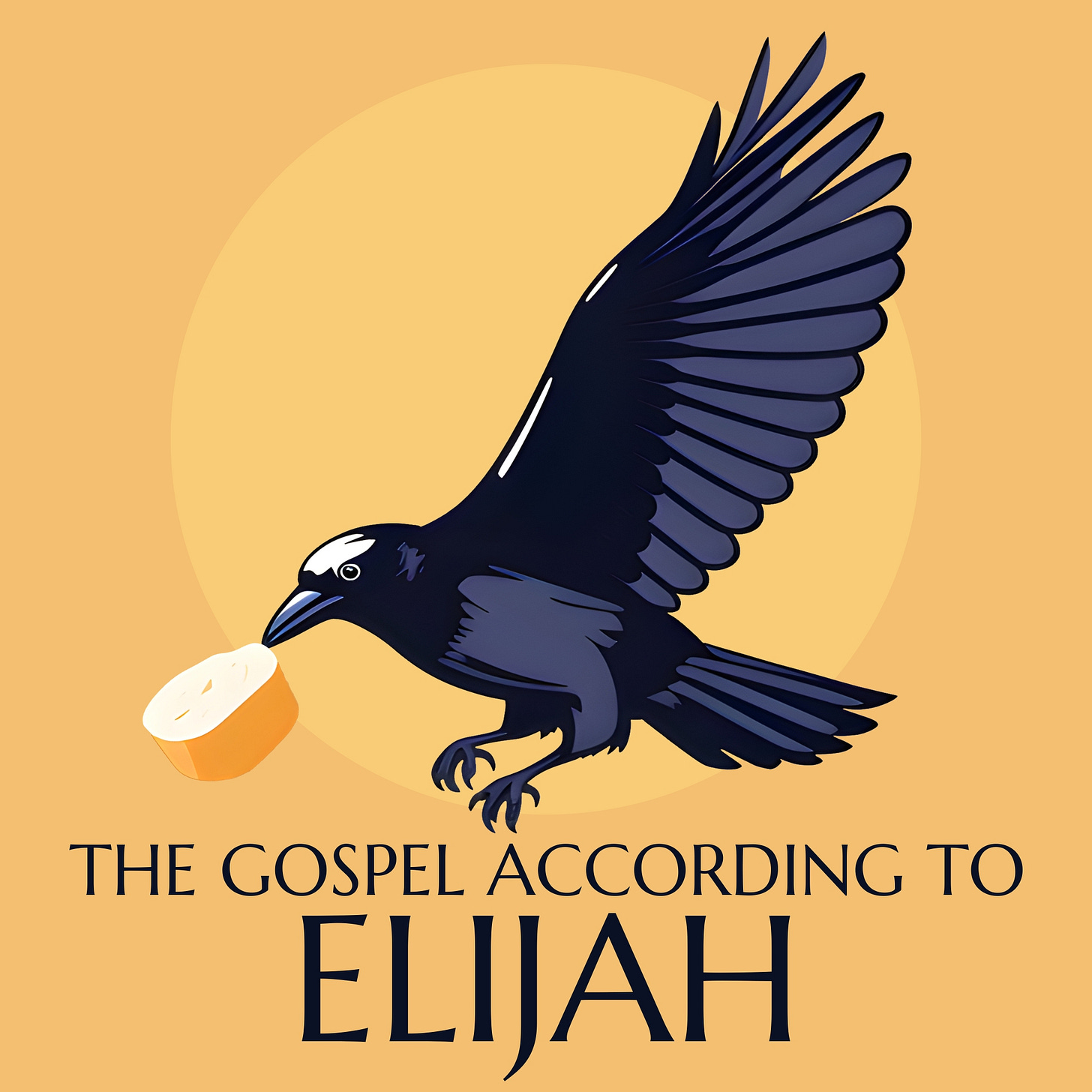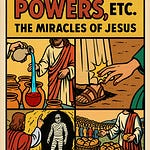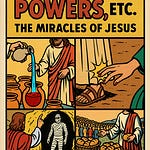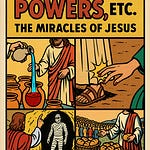1 Kings 18.40-46
The New Testament Book of Hebrews exhorts followers of Christ to sabbath rest on the grounds that "the word of God is living and active, sharper than any two-edged sword, piercing to the division of soul and of spirit, of joints and of marrow, and discerning the thoughts and intentions of the heart.”
In other words, the word does not record; the word works surgery upon us.
Two thousand years later it may surprise Christians that the word of God so named by the Book of Hebrews is the Hebrew Bible.
What we now call the Old Testament was the only scripture known to and authoritative for the apostles. Accordingly, the New Testament has a different, more provisional authority than the Old Testament. Whereas the scriptures of Israel were the unquestioned Bible of Mary’s boy and so authoritative, the New Testament canon came together under emergency duress.
A second century bishop named Marcion of Sinope took it upon himself to codify the very first Christian canon. Marcion divided his proto- New Testament into two sections, the Evangelikon, which was a shorter version of the Gospel of Luke, and the Apostolikon, which was a selection of ten Pauline epistles.
One of Paul’s most radical apprentices, Marcion allegedly understood the apostle Paul so well that he ultimately misunderstood Paul and his message. What prompted Marcion to codify the church’s own scripture was his revulsion over the violence and evil displayed in the Old Testament and often attributed to its God.
Reading the Hebrew Bible, Marcion insisted that the God of Israel could not possibly be the Father of the Lord Jesus Christ.
Consequently, Marcion rejected the Old Testament outright and excised from apostolic documents any sections he found offensively Jewish. Marcion was the first in the church to posit a distinction between the "wrathful Jewish God" of the Old Testament and the “loving God of Jesus Christ.”
By contrasting the God of Israel with the one true Israelite, Jesus Christ, Marcion pitted the Father against the Son and so ruptured the Trinity. Just so, the church excommunicated Marcion as a heretic and repudiated Marcionism as heresy in 144 AD and, forthwith, before another Marcion could rear his head, the church cobbled together the canon we now call the New Testament.
Marcion was an antisemite probably.
Marcion was a fundamentalist certainly.
Marcion was a heretic incontrovertibly.
Nevertheless!
Marcion was not irrational.
Only a liar would argue the Old Testament never seems to portray Yahweh in ways incommensurate with Christ and him crucified.
But if Jesus is who scripture attests, “the image of the invisible," then what do we do with passages like this passage in the Book of Kings where, having answered the prophet’s prayer with fire, the Lord leads Elijah to drag the false prophets of Baal down to the Wadi Kishon to kill them.
All four hundred and fifty of them.
It’s a strict stipulation of the doctrine of the Trinity that whatever you may say about one person of the Trinity you may say about another person of the Trinity.
For example, “The Holy Spirit created heaven and earth.”
And, “On the cross, God died.”
Or, in this case:
“Jesus commanded Elijah, saying “Seize the prophets of Baal; do not let one of them escape.” Then they seized them; and Elijah brought them down to the Wadi Kishon, and, according to Jesus’s word, he killed them there.”
Marcion was not unreasonable.
I remember my first summer as a preacher.
The church was in Year B of the lectionary and the assigned Old Testament passage for that Sunday of July was from 2 Samuel 6.
The story of Uzzah and the ark.
Dew was still burning off the grass in the parking lot as people trickled into the sanctuary.
Because Irma, the organist, wanted to take a break that Sunday, the morning’s music was led by her husband Les, who was as deaf as anyone I’ve ever met and who played the accordion in tones I can only describe as “asthmatic kitty.”
Because I was not only new to preaching but relatively new to the faith, I didn’t know any better and I treated the scripture text as straight up as Marcion of Sinope might have interpreted it.
In case you have forgotten it, 2 Samuel 6 reports King David, having defeated the Philistines, reclaiming the ark of God to take it to Jerusalem.
With thirty thousand soldiers celebrating before the ark with lyres and harps and tambourines and castanets, David dances half-naked. At a certain point in the procession, however, the oxen pulling the cart on which the ark rested “stumble.”
The oxen stumble.
The cart rocks.
The ark tips over.
And the poor bastard walking beside the cart— Uzzah— reaches out his hand to steady the ark of God to keep it from falling.
That’s all he does.
But, reports the Book of Samuel, “the anger of the Lord was thus kindled against Uzzah, and God struck him down there because of his error.”
Back then, I knew the Lord. But I did not yet know how to read his word. Or preach it.
I knew the Risen Lord; he had encountered me. But I did not yet know how to seek him in the scriptures. That Sunday, I took the text matter-of-factly.
The congregation that day they listened politely, but I could see. I could spy it from Sheldon sitting in the front pew and from Bob seated halfway back and from Andy all the way in the back by the aisle— I saw they didn’t care much about about the ark, or about Kingdom history or about David’s political maneuvering.
I could see in their furrowed brows and anxious faces.
They wanted to know about Uzzah.
At that point in my ministry I wasn’t very observant from the pulpit, but that morning I could tell that ever since Pam had read the scripture aloud everyone in the congregation was wondering, “Well, wasn’t Uzzah just trying to help?’
I pressed ahead anyway.
According to 1 Samuel 6, I told them, the ark was supposed to be carried on poles by Levites, Israel’s special caste of priests.
But that’s not what happens here. Either everyone had forgotten or, in their rush to get the ark to Jerusalem, they didn’t care. So instead of on gilded poles, it’s put on a wagon. Instead of being carried by priests it’s pulled by oxen.
In other words, according to this interpretation, Uzzah dies because he didn’t follow the directions.
His haste to catch the ark is actually his trying to avoid the consequences of his actions. In other words, he had it coming to him.
Seeing their sphincters tighten, I conceded— I still have the manuscript:
“You can parse this passage a hundred different ways. But the bottom line is that Uzzah’s death is meant to be a reminder of God’s holiness. Uzzah’s death is meant to point out to us what it points out to King David— that this God is not One with whom we can trifle.”
And from there I wound my sermon to a close with a litany of DON’Ts.
Don’t reach out to this God if you’re aren’t serious about it, if you don’t want an answer or won’t follow through.
Don’t live any way you want, just coming here once a week, taking God’s mercy for granted.
Don’t come to Christ’s Table if you’re not sincere about living according to his Kingdom.
DON’T.
Don’t confess your sins if you’re not going to live a redeemed life.
Don’t pray if you’re not going to heed the answer.
Don’t come here on Sunday if you’re not here to worship.
This God is not One to treat casually. This God has the freedom to be angry. And his righteous wrath has the power to knock you down. Faith in this God is not for the phony or feeble-hearted. Faith in this God is like playing with fire.”
I preached.
And if memory serves me right I even wagged my finger at them.
Looking back, I suppose it was a bit intense for what was only my second Sunday at that church.
But not only was it too intense— all law— it was unworthy of Jesus.
As it happens, in short order the Lord Jesus would show me my interpretation of his word was not worthy of him.
And Jesus would use that very passage— that text of terror— to teach me.
The Jewish philosopher Martin Buber recalls a day he sat on a train next to a stranger Buber quickly deduced was a devout Jew. Soon the philosopher found himself confessing to the worshipper his revulsion at a particular passage of scripture the stranger was reading, Saul’s slaughter— on the Lord’s command— of all the Amalekites.
Buber confided to the stranger that the Bible passage had perplexed him since he was a boy.
He confessed to his fellow passenger, “I have never been able to believe that this is a message of God,” Buber told his train mate, “I do not believe it.”
In reply, Buber writes, the stranger’s glance “flamed into my eyes” like a surgeon’s scalpel. Then the man merely sat silently for a long duration, pondering the philosopher’s words in his heart. After a while, the stranger asked Buber, “So, you do not believe it?”
The philosopher said he did not.
The stranger nodded.
A few beats later, the stranger asked him again, this time almost threateningly, “So, you do not believe it?”
Buber again said he did not believe it.
The stranger asked again— three times— “So, you do not believe it?”
And Buber replied:
“I believe that Samuel misunderstood God.”
Both of them then fell into silence, Buber recalls, until the stranger asked again, “So, you believe that?”
“Yes.”
“Suddenly, the man’s anger vanished.”
And Buber writes that the stranger looked up at Buber and smiled, like a teacher to a student, “Well, I think so, too.”
Looking back on the train ride, Buber observes how it surprises him, even years later:
“There is in the end nothing astonishing in the fact that an observant Jew, when he has to choose between God and the Bible, chooses God: the God in whom he believes, Him in whom he can believe. And yet, it seemed to me at that time significant and still seems so to me today.”
After worship that Sunday in July, Uzzah’s unfortunate fate still ringing in everyone’s earballs, a woman in her late thirties came up to me at the church doors.
She had a streak of white in the black hair she wore pulled back into a ponytail. She was crying. And clearly she had been crying. Her cheeks were wet and her eyes a tired red. Like my first Sunday, she’d come alone to worship, clutching her purse like a teddy bear.
She took off her glasses to blow her nose, and then she stared at me.
She didn’t look angry. She looked like I’d pulled the rug out from underneath her. Or like she’d just crashed against the scripture. And now she was falling.
“I never thought I would be able to get pregnant,” she said to me well above a whisper. She was too upset to worry who might overhear her. “I never thought I would be able to get pregnant— that’s what the doctors always told me. But then, by some miracle, I did. My husband and I, we even called it that, “Our miracle.” We called it that for six months. And then last month we lost her.”
Sadie.
She looked at me, and I felt all her grief being imputed to me.
And immediately I wondered if my LSAT scores were still good for law school.
Then she said, “Your sermon— that scripture, the God you described…all I kept thinking…”
She shook her head side to side and her voice trailed off.
“Yes?”
This time she got loud.
“All I kept thinking throughout your sermon was WHAT ABOUT UZZAH’S MOTHER?! WHAT ABOUT HIS MOTHER?! What about her?! What word do you have for her?!”
WHAT ABOUT UZZAH’S MOTHER?!
And just then I felt like the one who’d been dashed against the passage.
Busted and broken.
And in need of surgery.
Like a gaping wound, I suddenly saw that the Lord who had encountered me and summoned me to faith and called me to ministry was not the same person I had just preached.
In his book On the Inspiration of Scripture, the theologian Robert Jenson points to the many medieval paintings which show the Holy Spirit hovering beyond a biblical writer as he puts his witness to the page to compose the canon.
It is our tendency to think of the Spirit’s relation to the scriptures as extrinsic— outside of us— and historic— back before us— that is the chief error that has distorted the church’s understanding of the inspiration of scripture.
“The pictures that show the moment of inspiration as the Spirit bending over a busily writing prophet or apostle,” Jenson writes, “depict the wrong scene altogether.”
Because, of course, as we acknowledge at every baptism and in every prayer meeting, “the mighty acts of God” go on today.
The apostolic church enjoys no advantage over us in terms of the Spirit’s activity.
To make it plain:
The scriptures were not inspired by the Spirit.
The Spirit inspires the scriptures.
The Spirit inspires with the scriptures.
The doctrine of inspiration does not mean that the Bible is a record of reliable information about God. Of course that’s not what it means— rabbits don’t chew the cud, as the Book of Leviticus seems to think.
The doctrine of inspiration does not mean that the Bible is a record of reliable information about God.
The doctrine of inspiration means that the Bible is the reliable way God acts savingly in our lives.
The correct picture of scripture’s inspired nature is not the picture that shows the Spirit bending over the narrator of 1 Kings or Paul as he writes to the church in Corinth. The correct picture is, well, you and me, waiting like Moses in the cleft of the rock, for the Lord to pass through a passage of scripture: “May the words of my mouth and the meditation of all our hearts be your living word…”
Just so—
When it comes to scripture, the question is not How.
How can we know the scriptures are true?
When it comes to the Bible, the questions are Who and Why.
Who has given us the scriptures?
And why has the Lord given them to us?
That is, who is he making us to be?
In other words, before you have a definition of scripture’s authority, you must be able to answer the question, “Saved for what? To what End has the Lord acted for us in Jesus Christ?”
Once again, the passage from the Book of Hebrews provides the answer. Your sin belongs to Christ and his righteousness is your permanent perfect record; so that, we would become both a temple and a kingdom of priests for the sake of the world.
Fundamentally, the word is no different than water, wine, or bread. The Lord gives us the scriptures in order to make us holy.
The Lord gives us the scriptures in order to make us holy by our encountering him there.
He uses scripture to do surgery on us. He uses scripture to cut away the parts of us that do not comport with him. As scripture itself attests, "the word of God is sharper than any two-edged sword, cutting joint from marrow, and exhuming the thoughts and intentions of the heart.”
If the Bible is not a record of reliable information about God but is instead the reliable way God acts savingly in our lives, then it surely follows that God can use even the troubling texts of scripture to sanctify us.
In fact, this is what the ancient church fathers called “spiritual exegesis.”
According to the church father Origen, scripture is inspired in that it is divinely designed exactly to elicit our troubled response that in turn sanctifies us.
That is to say, the Lord intends for us to trip over certain scriptures so that we fall in to the mercy of the true God.
Remarking on the difficulty presented by Old Testament passages like 1 Kings 18.40, Origen commented:
“The Word of God has arranged that certain stumbling blocks, as it were, and obstacles and impossibilities be inserted into the midst of the Law and the narrative, in order that we may not be drawn away completely by the sheer attractiveness of the language and so we either completely reject the teachings, learning nothing worthy of God, or, not moving away from the letter, we learn nothing more divine.”
In other words—
Scripture sanctifies us not by merely reporting information about God.
For example, “God is love.”
Scripture sanctifies us by catching us up in our assumptions about God.
For example, it’s not God who is called into question.
Today, it’s not God who is called into question; its Elijah.
Notice the passage never explicitly says God told Elijah to slaughter the prophets of Baal.
In our sin and unbelief, we supply the summons— and I’ve gotten you this far into the sermon assuming it was so.
I lured you into thinking the Lord probably issued such an order.
But verse forty does not begin, “The word of the Lord came to Elijah, saying, “Seize the prophets of Baal…”” Look again, it’s not there. And turn to the next chapter, what do you discover? Elijah is depressed and bereft, lamenting that he was zealous for the Lord but the Lord is now with him not.
Why?
Because in his zeal for the Lord, he took it upon himself to execute the four hundred and fifty prophets of Baal. He did that act, and—like so many believers today— he attributed his actions to the Lord.
According to Origen, the Lord providentially sticks stumbling blocks into the Bible precisely so that we will trip up and tumble over and fall into his gracious and loving arms.
In other words, the ugly parts and nasty bits are there for a purpose. Or, as the Protestant Reformers put it, we are mortified and vivified in our encounter with the troublesome texts of scripture. They open us up and expose us. And, so doing, they heal us.
“WHAT ABOUT UZZAH’S MOTHER?!”
She asked me in the exit line— no, she demanded of me.
I stammered.
Until finally I said, “Well, what would you say to Uzzah’s mother? I suspect she’d rather hear from you.”
And then she took my hands— both of my hands— and placed them on the belly where her baby had been.
I attempted to ignore the shame flushing on my cheeks and the tears welling in the corners of my eyes.
She looked me straight on— damn the vulnerability— and she said, “I think God’s power and presence and holiness was found not in a gilded box that could blow at any time, but in the ark of a mother’s womb, like Mary’s womb.”
“Like this one,” and she pressed my hands deeper into her belly.
She held my hands there and said, “On those same grounds, I refuse to believe what you said and I don’t believe you really believe it. I don’t believe that God takes us from us for reasons all his own. I believe that God loves us so much that he gives, gives even himself.”
She released me from my her grip.
My hands fell back from her belly.
They landed at my sides like I was a patient on an operating table.
“I guess I’d say something like that to Uzzah’s Mom. What do you think?”
“What do I think? I think the Lord stuck this passage into scripture; so that, you would preach this precise word. To me. Today.”
The word of the Lord is not always comforting Frequently, it is confusing. Rarely, is it finished.
So come to the table.
It is more than a supper table; it is an operating table.
The word has opened the wound.
So come to the table. With word and wine and bread, let the Great Physician finish his work. To make you what you otherwise would not be.













